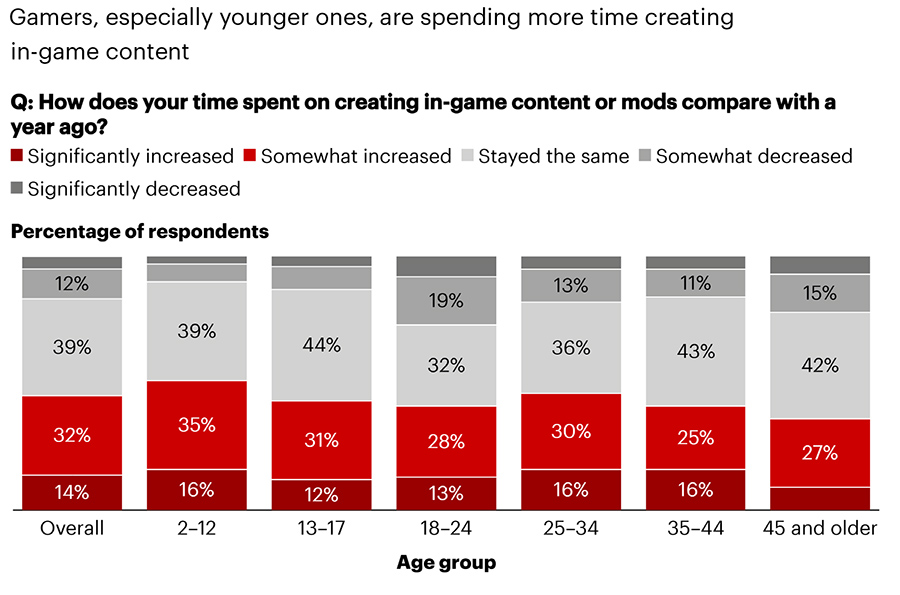Dasiwang: Your Gateway to Trending Insights
Stay updated with the latest news, trends, and insights across various topics.
Play, Create, Profit: The Rise of User-Generated Gaming Economies
Unleash your creativity and profit in the booming world of user-generated gaming! Discover how players are shaping the future of gaming economies.
Exploring the Impact of User-Generated Content on Gaming Economies
User-generated content (UGC) has revolutionized the landscape of gaming economies, offering players a platform to express creativity and build communities. UGC encompasses everything from custom levels and skins to entire game modifications, which not only enhance the gaming experience but also create new economic opportunities. For instance, games like Roblox and Fortnite highlight this trend by allowing players to create and sell their own content. This has opened avenues for developers to monetize their platforms, as they can take a percentage of sales from user creations, thus fostering an ecosystem where players are both consumers and creators.
The impact of user-generated content extends beyond individual games; it contributes significantly to the overall gaming economy. By allowing players to engage in commerce through their creations, game developers can stimulate both engagement and revenue growth. According to recent studies, UGC can lead to a substantial increase in game longevity and player retention, as participants continuously seek new content and engage with the community. This dynamic not only benefits the developers but also empowers players, transforming them into vital stakeholders within the gaming economy.

Counter-Strike is a popular multiplayer first-person shooter game that pits teams of terrorists against counter-terrorists. Players can enhance their gaming experience by utilizing various skins and in-game items. For gamers interested in acquiring skins, using a daddyskins promo code can provide valuable discounts and bonuses. The competitive nature of the game, combined with its strategic elements, has contributed to its enduring popularity in the esports scene.
How Gamers are Creating Real Income through User-Generated Games
In recent years, the gaming industry has seen a remarkable shift as gamers are leveraging their creativity to produce user-generated games that not only engage audiences but also generate real income. Platforms like Roblox and Fortnite have revolutionized the way players interact with games, allowing them to design their own experiences and monetize them through in-game purchases and subscriptions. This emergence of user-generated content not only empowers gamers to unleash their creativity but also democratizes income opportunities in the industry.
By utilizing tools and engines designed for user-friendly game development, anyone with a passion for gaming can create an experience that resonates with the community. Many successful developers have reported making substantial earnings through microtransactions, sponsorships, and advertising. Furthermore, the rise of streaming platforms like Twitch and YouTube allows these creators to showcase their work, opening new pathways for income via ad revenue and fan donations. As the trend continues, it's clear that the connection between gamers and real-world financial success is stronger than ever, signaling a new era in the gaming landscape.
What You Need to Know About the Future of User-Generated Gaming Economies
The landscape of user-generated gaming economies is rapidly evolving, driven by the proliferation of creative platforms and technological advancements. As more players engage with games not just as consumers but as creators, the concept of ownership and monetization is being redefined. Gamers are now able to craft their own content—from custom mods to entire virtual worlds—allowing them to build in-game economies that reflect their creativity. This shift not only empowers players but also encourages a collaborative ecosystem where everyone can partake in the financial rewards of their contributions.
Looking ahead, several trends are expected to shape the future of user-generated gaming economies. First, the integration of blockchain technology is likely to enhance transparency and security in these markets, enabling players to trade digital assets with confidence. Additionally, platforms that facilitate the creation and distribution of user-generated content will continue to expand, bringing new opportunities for income generation. Finally, as virtual reality and augmented reality become more mainstream, the immersive experiences they offer could further monetize user-generated content, making the gaming landscape even more dynamic and profitable.